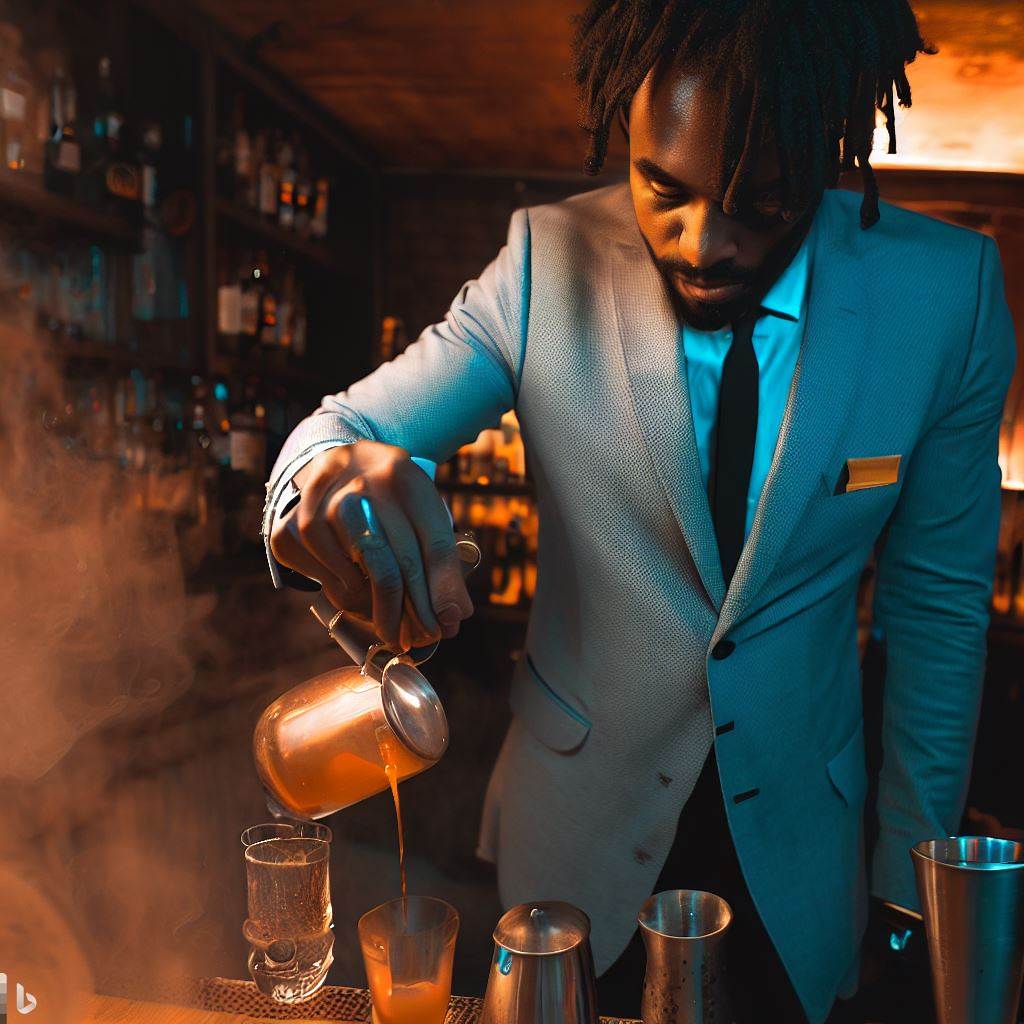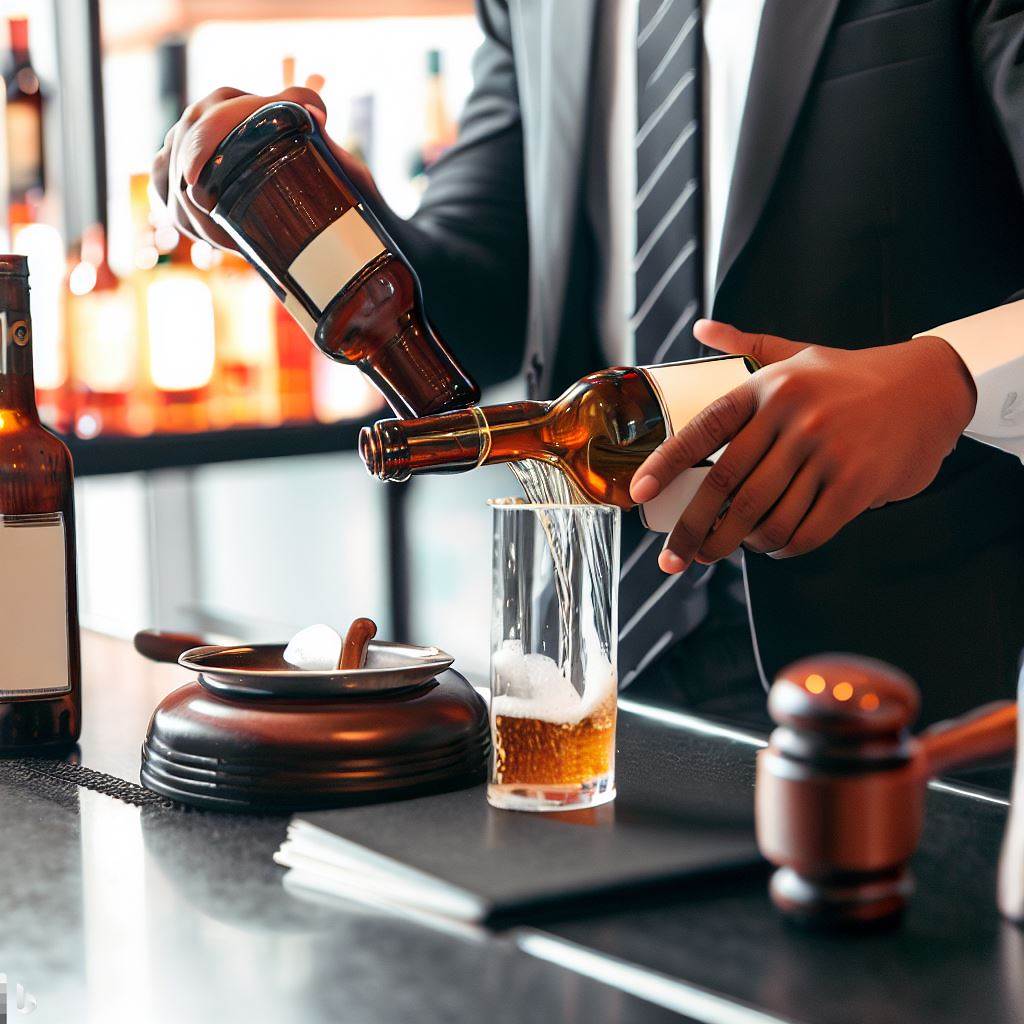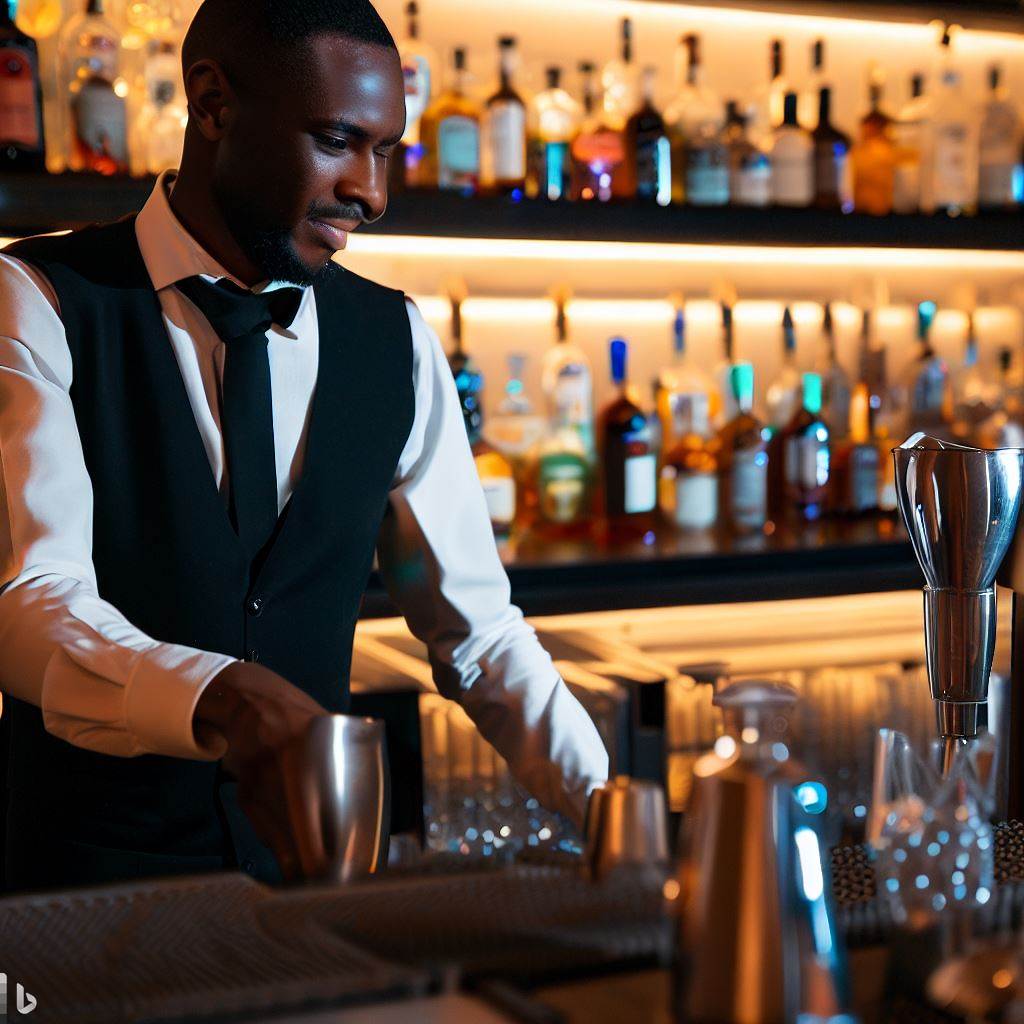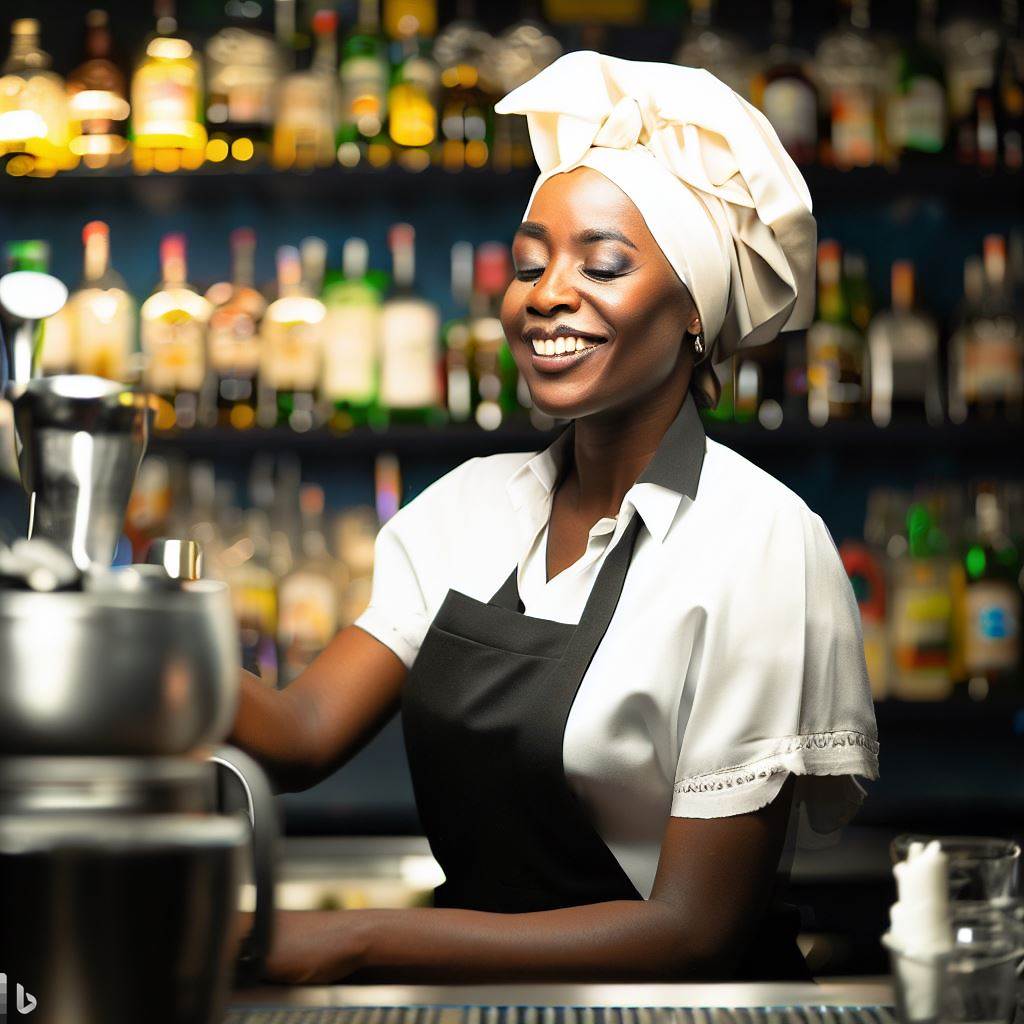Introduction
Mixology is the intricate art of crafting cocktails, an indispensable skill within the bartending industry.
It revolves around the precise blending of spirits, flavors, and ingredients to conjure exquisite libations that tantalize the taste buds and elevate the overall drinking experience.
This blog post sets its sights on the ever-evolving world of bartending in Nigeria. We’ll delve into the latest trends, innovations, and creative concoctions that are shaping the country’s burgeoning cocktail scene.
From the fusion of traditional Nigerian flavors with global spirits to the rise of craft cocktails in upscale bars, we aim to provide a comprehensive insight into the dynamic landscape of Nigerian bartending.
In summary, this post embarks on a journey into the enchanting realm of mixology, exploring its significance in the bartending industry.
Moreover, we’ll navigate through the contemporary trends that are redefining the art of bartending in Nigeria, promising a delightful exploration of flavors and techniques.
History of Mixology in Nigeria
A. Overview of the early years of bartending in Nigeria
- Bartending in Nigeria has a rich history dating back to the early 20th century.
- During the colonial era, bartending was primarily done by expatriates in hotels and clubs.
- Nigerians gradually took interest in the art of bartending and started entering the profession.
- Initially, bartending was seen as a low-status job, but it gained recognition over time.
- The early years of bartending in Nigeria witnessed a limited variety of drinks being served.
- Most bartenders at that time focused on serving traditional local drinks like palm wine and local spirits.
- Customers often had a limited understanding of cocktails and preferred simpler, familiar drinks.
- However, with the passage of time, the demand for more diverse and innovative mixes increased.
- As the tourism industry grew, bartending in Nigeria also underwent significant changes to keep up with international standards.
B. Influence of foreign cultures on the development of mixology in the country
- The influence of foreign cultures played a crucial role in shaping the mixology scene in Nigeria.
- The introduction of global trends and popularity of international spirits opened up new avenues for Nigerian bartenders.
- As Nigerians traveled abroad and experienced different cocktail cultures, they brought back new ideas.
- Foreign bartenders working in Nigeria also played a pivotal role in introducing innovative mixing styles.
- The fusion of Nigerian ingredients with exotic spirits and mixers became a winning formula.
- Bartenders began experimenting with local flavors like hibiscus, ginger, and tropical fruits in their concoctions.
- This resulted in the creation of unique Nigerian-inspired cocktails that started gaining popularity.
- The influence of foreign cultures also led to the introduction of flair bartending in Nigeria.
- Flair bartending, with its impressive tricks and visual displays, added an exciting element to the mixology scene.
In fact, the history of mixology in Nigeria highlights the evolution of bartending from its early years to its current vibrant state.
As Nigerian bartenders embraced international influences and fused them with local flavors, the mixology scene in the country became more diverse and innovative.
Today, Nigeria boasts a flourishing cocktail culture that continues to evolve and set trends within the global bartending community.
Read: Skills Needed to Succeed as a Bartender in Nigeria
Current Mixology Trends in Nigeria
A. Rise of Craft Cocktails and Specialty Drinks
As the art of mixology continues to gain popularity in Nigeria, there has been a significant rise in the demand for craft cocktails and specialty drinks.
Bartenders are now focusing on creating unique and sophisticated concoctions using high-quality spirits, fresh ingredients, and innovative techniques.
The craft cocktail movement has elevated the drinking experience, with bartenders showcasing their creativity and skill through carefully curated flavor combinations.
B. Emphasizing Locally-Sourced Ingredients and Flavors
In recent years, there has been a growing emphasis on using locally-sourced ingredients and flavors in Nigerian mixology.
Bartenders are increasingly incorporating indigenous fruits, herbs, and spices into their cocktail recipes to showcase the rich and diverse flavors of the country.
By using local ingredients, bartenders can provide a unique and authentic taste that reflects the cultural heritage of Nigeria.
C. Experimental and Innovative Techniques Used by Bartenders
The mixology scene in Nigeria has witnessed a surge in experimental and innovative techniques employed by bartenders.
From molecular mixology to smoke-infused cocktails, bartenders are pushing the boundaries of traditional cocktail-making methods.
These techniques not only enhance the visual appeal of the drinks but also elevate the overall drinking experience for patrons.
D. Popularity of Themed Bars and Speakeasies
Themed bars and speakeasies have become increasingly popular in Nigeria, adding a new dimension to the mixology culture.
These bars are designed to transport patrons to a different era or create a specific ambiance, often inspired by movies, literature, or historical periods.
From retro-themed bars to hidden speakeasies, these establishments offer a unique and immersive drinking experience.
In short, the current mixology trends in Nigeria showcase the growing sophistication and creativity of the bartending scene.
The rise of craft cocktails and specialty drinks, along with the emphasis on locally-sourced ingredients and flavors, have elevated the drinking experience for patrons.
Bartenders are employing experimental and innovative techniques to create visually stunning and delicious concoctions.
Additionally, themed bars and speakeasies have added a touch of excitement and nostalgia to the mixology culture.
These trends demonstrate the evolving and dynamic nature of bartending in Nigeria, making it an exciting time for cocktail enthusiasts and bartenders alike.
Read: Top Bartending Schools in Nigeria: A Complete Guide

Impact of Social Media on Mixology in Nigeria
Social media has revolutionized the way we interact, communicate, and share information.
In Nigeria, the impact of social media on mixology, the art of bartending and cocktail creation, has been profound.
A. Utilization of platforms like Instagram and TikTok for drink inspiration
Instagram and TikTok have become popular platforms for Nigerian mixologists to showcase their creativity and inspire others.
These platforms allow bartenders to visually showcase their cocktail creations, sharing recipes, and techniques.
The visually appealing nature of these platforms makes them perfect for cocktail enthusiasts to discover new and exciting drink ideas.
Nigerian mixologists have taken advantage of the visual nature of Instagram and TikTok to share stunning images and videos of their drinks.
By using clever camera angles, special effects, and impressive garnishes, they entice viewers and drive engagement.
These platforms have become virtual cocktail menus, offering a wealth of inspiration for drink enthusiasts.
B. Influencer culture and its influence on drink choices
With the rise of influencer culture, social media has significantly influenced drink choices in Nigeria.
Influencers carry great influence over their followers, who often look to them for recommendations and trends.
Many Nigerian influencers have started incorporating mixology into their content, showcasing unique cocktails and promoting specific brands.
These influencers have the power to shape drink preferences and introduce new trends by featuring specific cocktails in their posts.
By endorsing particular spirits, mixers, or techniques, they influence their followers to try out these drinks and bars.
This has created a culture of exploration and experimentation in Nigeria’s bartending scene.
C. Positive and negative effects of social media on the bartending industry
While social media has undoubtedly had positive effects on the bartending industry in Nigeria, it also brings some challenges.
On the positive side, social media has allowed bartenders to reach a wider audience, promote their craft, and showcase their skills.
It has also facilitated knowledge sharing among mixologists, leading to innovation and creativity.
However, the negative effects should not be ignored. Social media can create unrealistic expectations for bartenders, with the pressure to constantly create unique and visually stunning cocktails.
This can lead to a focus on appearance rather than taste and quality.
Additionally, the prevalence of influencers endorsing specific brands can sometimes overshadow the talent and skill of bartenders.
Moreover, social media has also been a breeding ground for misinformation and plagiarism within the bartending industry.
Some bartenders may mimic popular recipes without giving credit to the original creators, leading to a lack of recognition for the true innovators.
In general, social media has had a significant impact on mixology and the bartending industry in Nigeria.
Platforms like Instagram and TikTok have become sources of inspiration, while influencer culture has influenced drink choices.
Although social media has opened up opportunities, it is important to consider the potential negative effects it brings.
Finding a balance between creativity, authenticity, and quality is crucial to maintain the integrity of the craft.
Read: How to Become a Certified Bartender in Nigeria
Learn More: Salary Insights: What Does a Sommelier Earn in Nigeria?
Training and Education in Mixology
A. Overview of available mixology courses and certifications in Nigeria
- Mixology schools like The Bartender Academy and Liquid Learning offer comprehensive courses in Nigeria.
- These courses cover topics such as cocktail preparation, mixology techniques, and customer service skills.
- Certifications like the International Bartenders Association (IBA) certification are recognized globally and can enhance job opportunities.
B. Importance of continuous learning and skill development for bartenders
- The field of mixology is constantly evolving, with new trends, techniques, and ingredients emerging.
- Continuous learning allows bartenders to stay up to date with the latest industry developments.
- Skill development enables bartenders to refine their craft and provide exceptional customer experiences.
- Ongoing education also helps bartenders expand their knowledge of different spirits and cocktails.
C. Role of mixology competitions in promoting growth and creativity
- Mixology competitions provide bartenders with a platform to showcase their skills and creativity.
- Participating in competitions challenges bartenders to push their limits and come up with innovative cocktail recipes.
- Competitions also foster a sense of community among bartenders, allowing them to network and learn from each other.
- Winning or placing in competitions can enhance a bartender’s reputation and open doors for career advancements.
In essence, training and education play a crucial role in the world of mixology.
Bar professionals in Nigeria have access to various mixology courses and certifications provided by institutions like The Bartender Academy and Liquid Learning.
Continuous learning and skill development are essential for bartenders to keep up with the evolving industry and provide exceptional customer experiences.
Mixology competitions further promote growth and creativity, offering bartenders a platform to showcase their skills, learn from others, and advance their careers.
By investing in training and education, bartenders in Nigeria can elevate the art of mixology and contribute to the vibrant bartending scene in the country.
Read: Earnings Insight: Bartender Salaries in Nigeria
Delve into the Subject: Ethics and Legalities: A Casino Host’s Life in Nigeria
Conclusion
A. Recap of key points discussed in the blog post
Throughout this blog post, we have explored the fascinating world of mixology in Nigeria and the emerging bartending trends within the country.
We discussed the rise in popularity of craft cocktails, the use of local ingredients, and the incorporation of traditional Nigerian flavors into modern drink recipes.
Additionally, we highlighted the importance of creativity and innovation in mixology, as bartenders are continuously pushing boundaries and experiment with new techniques.
B. Final thoughts on the future of mixology in Nigeria and its potential for growth and innovation
The future of mixology in Nigeria appears promising, with ample opportunities for growth and innovation.
As the demand for unique and inventive cocktails increases, bartenders are likely to continue exploring indigenous ingredients and techniques to create unforgettable drinking experiences.
Furthermore, the growing hospitality industry in Nigeria provides a platform for mixologists to showcase their skills and contribute to the nation’s flourishing cocktail culture.
With the right support and investment, Nigeria has the potential to become a hub for mixology in Africa.




